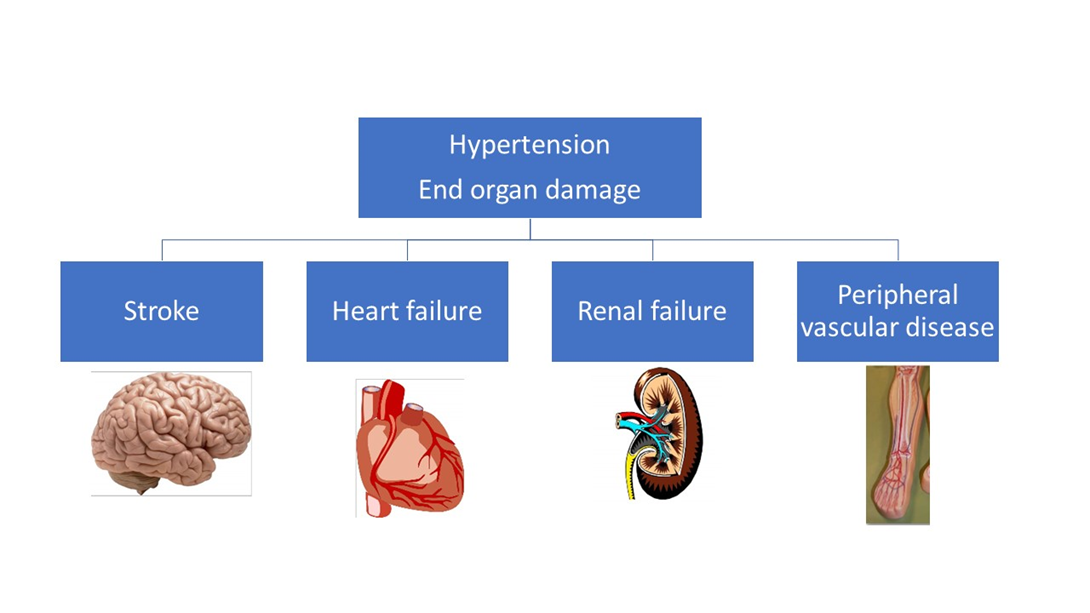Which are potential results of end-organ damage from chronic hypertension? (Select all that apply.)
Isolated systolic hypertension
Atrial fibrillation
Renal insufficiency
Stroke
Cardiac disease
Correct Answer : B,C,D,E
Choice A reason: Isolated systolic hypertension is not a result of end-organ damage from chronic hypertension, but rather a risk factor for it. Isolated systolic hypertension is a condition where the systolic blood pressure is elevated (>140 mmHg) while the diastolic blood pressure is normal (<90 mmHg). It is common in older adults due to the stiffening of the arteries, and can increase the risk of cardiovascular and cerebrovascular events.
Choice B reason: Atrial fibrillation is a result of end-organ damage from chronic hypertension. Atrial fibrillation is an irregular and often rapid heart rate that can cause poor blood flow and increase the risk of stroke and heart failure. Chronic hypertension can damage the heart muscle and the electrical system of the heart, leading to atrial fibrillation.
Choice C reason: Renal insufficiency is a result of end-organ damage from chronic hypertension. Renal insufficiency is a condition where the kidneys are unable to filter waste and fluid from the blood adequately. Chronic hypertension can damage the blood vessels and the nephrons of the kidneys, leading to renal insufficiency.
Choice D reason: Stroke is a result of end-organ damage from chronic hypertension. Stroke is a sudden interruption of blood supply to the brain, causing brain cell death and neurological deficits. Chronic hypertension can damage the blood vessels in the brain, making them prone to rupture (hemorrhagic stroke) or blockage (ischemic stroke).
Choice E reason: Cardiac disease is a result of end-organ damage from chronic hypertension. Cardiac disease is a broad term that encompasses various disorders of the heart, such as coronary artery disease, heart attack, heart failure, and cardiomyopathy. Chronic hypertension can damage the heart by increasing the workload and the oxygen demand of the heart, causing the heart to enlarge and weaken over time.

Nursing Test Bank
Naxlex Comprehensive Predictor Exams
Related Questions
Correct Answer is D
Explanation
Choice A reason: Older adult’s self-report is not the most helpful tool, as it may not be reliable or consistent in older adults, especially if they have cognitive impairment, communication difficulties, or cultural barriers. Older adults may also underreport or overreport their pain due to fear, stoicism, or expectations.
Choice B reason: FPS-R (Faces Pain Scale-Revised) is not the most helpful tool, as it may not be suitable or valid for older adults, especially if they have visual impairment, facial paralysis, or dementia. FPS-R is a pictorial scale that uses six facial expressions to represent different levels of pain intensity, from 0 (no pain) to 10 (very much pain).
Choice C reason: Pain medication frequency is not the most helpful tool, as it may not reflect the actual pain level or the effectiveness of the pharmacotherapy. Pain medication frequency may vary depending on the type, dose, route, and duration of the medication, as well as the individual response and tolerance of the older adult.
Choice D reason: Older adult's pain diary is the most helpful tool, as it can provide a comprehensive and longitudinal record of the pain experience, including the location, intensity, quality, frequency, duration, triggers, relievers, and impact of the pain. A pain diary can also help track the use and response of the comfort measures, activity, and pharmacotherapy, and identify the patterns and trends of the pain.
Choice E reason: None of the above is not the correct answer, as there is one choice that is the most helpful tool for the nurse to use.
Correct Answer is A
Explanation
Choice A reason: The classic signs of elevated glucose levels, polyuria, polyphagia, and polydipsia are rarely present in older adults is true because older adults may have impaired thirst sensation, reduced appetite, or altered renal function that can mask these symptoms. They may also have other chronic conditions or medications that can affect their glucose levels or urine output.
Choice B reason: Older adults tend to metabolize glucose at a faster rate than younger adults is false because older adults usually have a slower metabolism and a reduced insulin sensitivity that can impair their glucose regulation. They may also have less muscle mass and more fat tissue that can affect their glucose utilization.
Choice C reason: Fingerstick glucose monitoring is inaccurate in older adults is false because fingerstick glucose monitoring is a reliable and convenient method to measure blood glucose levels in older adults, as long as they follow the proper technique and calibration. They may also benefit from using devices that have larger displays, voice output, or memory functions.
Choice D reason: There is a higher tolerance for elevated levels of circulating glucose in older adults is false because elevated levels of circulating glucose can cause serious complications in older adults, such as cardiovascular disease, kidney disease, nerve damage, or infections. Older adults may have a higher risk of developing these complications due to their age, comorbidities, or frailty.
Whether you are a student looking to ace your exams or a practicing nurse seeking to enhance your expertise , our nursing education contents will empower you with the confidence and competence to make a difference in the lives of patients and become a respected leader in the healthcare field.
Visit Naxlex, invest in your future and unlock endless possibilities with our unparalleled nursing education contents today
Report Wrong Answer on the Current Question
Do you disagree with the answer? If yes, what is your expected answer? Explain.
Kindly be descriptive with the issue you are facing.
